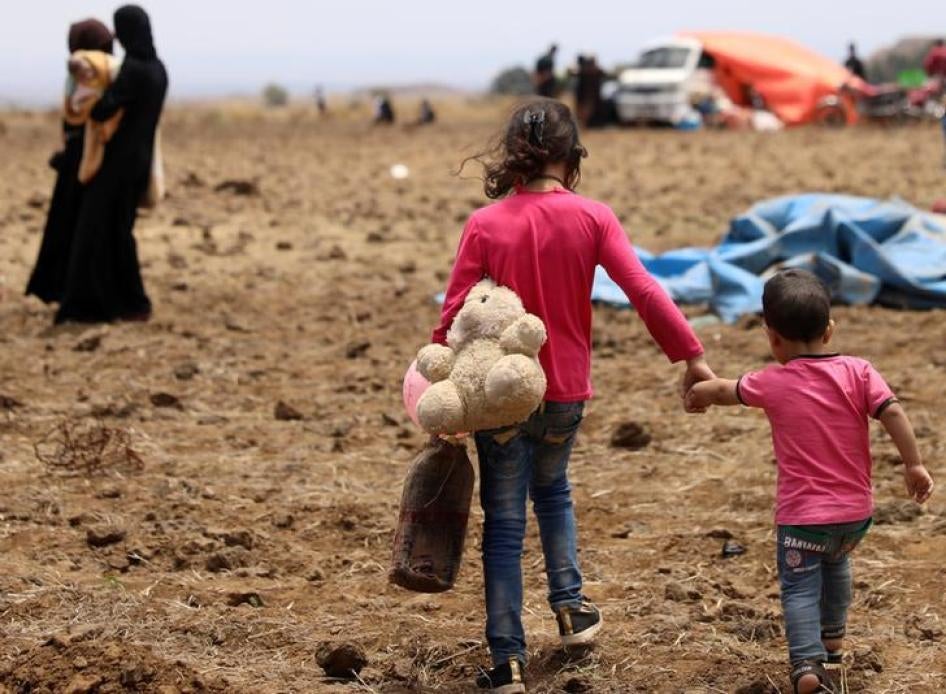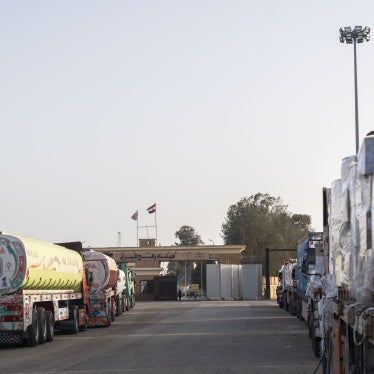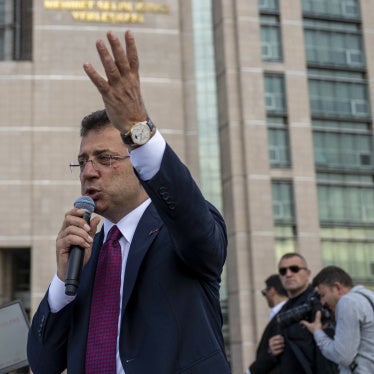(Beirut) – Jordanian and Israeli authorities should allow Syrians fleeing fighting in Daraa governorate to claim asylum and protect them, Human Rights Watch said today. On June 16, 2018, the Syrian-Russian military alliance opened an offensive in Daraa and Quneitra governorate, one of the last anti-government held areas in Syria. The United Nations estimates that 271,800 people have fled the hostilities thus far, moving toward the Jordanian border and the Israeli-occupied Golan Heights.
On June 26, 2018, Jordan’s new prime minister, Omar Razzaz, said at a news conference that Jordan “will not receive any new refugees from Syria.” On June 28, the Jordanian foreign affairs minister, Ayman al-Safadi, met with UN Secretary-General Antonio Guterres, and told him that Jordan will provide all support necessary to Syrians “on their own soil.” In response, dozens of Jordanian citizens have taken to social media to call on their government to open the border for Syrians. The Jordanian border has been closed to fleeing asylum seekers since at least June 2016.
“The abject refusal by Jordanian authorities to allow asylum seekers to seek protection not only goes against their international legal obligations, but against basic human decency,” said Lama Fakih, deputy Middle East director at Human Rights Watch. “Jordanians themselves are appealing to their government’s basic decency and calling for those in need to be let in.”
Since June 27, no aid convoy has been able to cross the border into Syria from Jordan due to their security concerns and the Syrian government has not authorized aid deliveries across the fighting lines. Residents told Human Rights Watch that displaced people residents along the border lack access to shelter, clean water, and food.
Daraa and Quneitra, which adjoin the occupied Golan Heights and Jordan, are part of one of four de-escalation zones in Syria established to stop hostilities and facilitate aid access until a political resolution is reached. The zone was negotiated by the United States, Jordan, and Russia. Local media activists reported relentless strikes and shelling by the Syrian-Russian military alliance onto towns in Daraa governorate since June 16, leading to extensive displacements.
Human Rights Watch spoke to five people, including three displaced Daraa residents who traveled to the Jordanian border attempting to flee the violence in the area, but could not due to the Jordanian border closure.
“There are displaced persons about two kilometers away from the border, but of course they can’t cross,” an activist who lived in Ghasam, a village near the Jordanian border, told Human Rights Watch on June 29. “Those who try face warning gunshots.”
The activist, whose name is withheld for his protection, said that almost every area in Eastern Daraa had been shelled or struck: “I visited most places that were struck except Reef al-Atash, given there are intense strikes and heavy clashes. I went to Busra, al-Karak, al-Musayfirah, al-Hirak, al-Jiza, al-Naihmah, Umm al Ma’azen, Al-Sahwah – and they were all hit by the Syrian government.”
He said that the towns are now entirely empty: “Nothing is left but stones…Have you ever heard of Grozny? This is how I’d compare the situation. It’s Grozny. The destruction is unbelievable,” he said, referring to the capital of Russia’s Chechnya region during the conflict there. Another resident said: “I was in Daraa al-Balad and I left to al-Karak, they shelled us there, I went to al-Jiza. There, the house I was staying in was shelled and we miraculously survived. From there, we fled to an area close to the Jordanian border. There is nowhere to go from here.”
He said he would enter Jordan if Jordanian authorities opened the border, but that it is clearly closed.
Mousa Zobi, the head of the Emergencies Committee for the Daraa Local Council, said that people are fleeing strikes and shelling but are also afraid of incoming Syrian government forces and pro-government militias retaking their areas. A resident of Tafas village in Daraa governorate confirmed this, saying that he was the only one left in his village but would leave if Syrian forces entered the village.
Zobi said he had visited the Jordanian border numerous times over the past two weeks and was trying to support the displaced people, but that humanitarian conditions were very difficult with limited and dwindling access to shelter, clean water, or food, and that he anticipates that the situation will only get worse as numbers of displaced people increase.
On June 29, the UN humanitarian arm, the Office for the Coordination of Humanitarian Affairs (OCHA), said that the displaced population is in urgent need of assistance, and that while this agency is able to provide support through supplies already there, the Syrian government has yet to give them permission to provide aid across the line of fighting.
The activist from Ghasam said that he visited the border regularly: “We have been trying to return [the displaced people] into the towns near the border because there’s nothing to shelter them on the border, no tents, no water, no sanitary services. Everything is unavailable.”
OCHA said that the area near the Jordanian border is also at risk from the ongoing hostilities, with aid convoys unable to cross since June 27 due to bombardment a few kilometers from the border.
Thousands of displaced Daraa residents have also gathered along the outskirts of the occupied Golan Heights. Media reports indicate that the delivery of aid from Israel is continuing to camps close to the occupied Golan Heights, though residents indicate that this is not nearly sufficient for their needs. On June 29, the Israeli army, which controls entry into the Golan Heights, said it will not allow Syrians fleeing the fighting in Daraa to enter, but will continue to provide aid. There is no access to the Golan Heights for residents of Syria without Israeli authorities’ permission.
Human Rights Watch has previously documented the Syrian government’s use of unlawful tactics in retaking territory from anti-government groups in places like Eastern Aleppo and Eastern Ghouta, including using prohibited weapons such as chemical weapons and incendiary and cluster munition attacks. The Syrian government, with the backing of its Russian ally, also restricted access to humanitarian aid and struck medical facilities during fighting in Eastern Aleppo and Eastern Ghouta.
On June 27, a hospital supported by the Syrian-American Medical Society in Daraa was attacked with six airstrikes, severely damaging the facility and killing one doctor, according to the organization. The attack on the hospital was the eighth reported on a medical facility by the Syrian-Russian military alliance in as many days.
International humanitarian law prohibits attacks directed against health facilities and medical workers. All parties to the conflict must take all feasible precautions to save civilian lives and should cease the use of prohibited weapons and unlawful attacks on civilians and medical facilities. All parties should all facilitate unimpeded humanitarian aid and access. All warring parties should provide permission for and facilitate cross-line and cross-border assistance.
Jordan and Israeli authorities operating in the occupied Golan Heights should allow asylum seekers to seek asylum in areas under their control, and facilitate the entry of humanitarian aid to serve the displaced population fleeing violence. The international community should also provide support to countries that are hosting refugees and providing humanitarian assistance.
“The situation in the southwest is so dangerous that even humanitarian convoys cannot cross to provide aid to populations in need,” Fakih said. “There is no stronger signal that Jordan and Israeli authorities should not close the door on Syrians fleeing to safety.”








